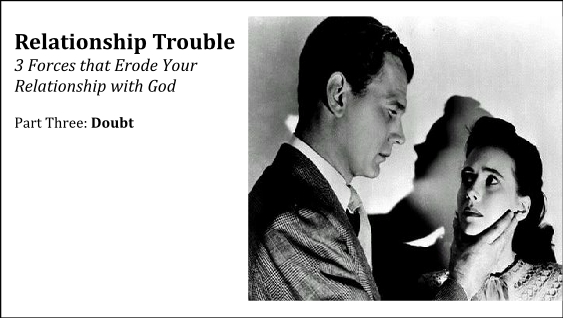By Tyson Thorne

So far this week we have looked at the emotion of fear and the intellectual problem of uncertainty. Today we look at the spirit of doubt. This third of three elements can come upon a person suddenly, or can work its way insidiously and slowly into our lives. I’m uncertain which the case was for a dear friend of mine who, when at a particularly low point in life, confessed that he was doubting that God is real. Having known the gentleman confessed faith in Jesus 25 or so years before, I answered that if he could honestly look back at his life and not see God’s hand in it, then he had every right to doubt. These were the last words we spoke that day and, thankfully, he called me the next day and said that he had given it much thought and could see a clear pattern of God’s work in him and others. God was real again.
It is rare for a person to go through their life and never doubt God’s existence. The advice I gave that evening wasn’t from any wisdom of my own, God had used similar reasoning in his relationship with Israel. Numerous times in the Old Testament God reminds his children of all he had done for them as a nation, rescuing them from slavery, allowing them to cross the Red Sea on dry ground, among other miracles. By remembering our past with God, it becomes impossible to deny him our future.
My friend has a much better memory than I do, which is why I keep a journal. It’s a discipline I started my freshman year in college and continue to this day. While I have not doubted God’s existence, I have taken comfort and encouragement by going back and reading of all the times and all the ways God has impacted my life. Some of my acquaintances use a personal video blog in place of a journal. The form or the media doesn’t matter as long as you have something to look back on and remind you of God’s gifts and mercies.
The three elements of fear, uncertainty and doubt (FUD) afflict even the best and strongest believers. We’ve seen already how it has impacted renowned men of Israel, the apostle Paul, Apollos, and many others since. The most famous doubter in Scripture must be Thomas. When Jesus told the disciples they were returning to Judea, a place where the Jews had previously made an attempt on his life, Thomas was willing to follow telling the others, “Let us go with him, that we may die with him” (John 11). Three chapters later, at the Passover meal, Jesus explains to his men that he will be killed and raised back to life, but that he is going to prepare a place for them, a place they will follow him to. It was Thomas who pointed out, “Lord, we don’t know where you are going, so how can we know the way?” But the most famous moment of Thomas’ life came when Jesus appeared to the 12 after his resurrection and demanded Jesus prove he was not a spirit, a demand Jesus was happy to appease (John 20).
The Bible doesn’t tell us what happened to Thomas, but there is strong evidence he made his way to India and started many churches there, performing healing miracles and introducing many to Jesus. Doubt is like temptation in that it will enter everyone’s life at some time, and that is not a sin. What matters is what we do with doubt. Is it an opportunity to remind ourselves of our past with God, or a burden that drags us away from Him?
|
|
|
